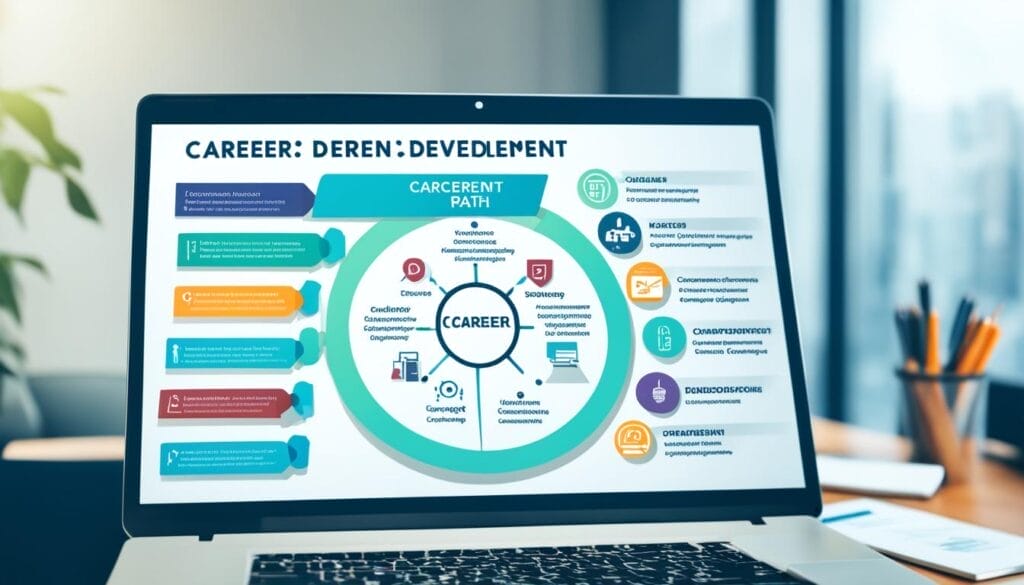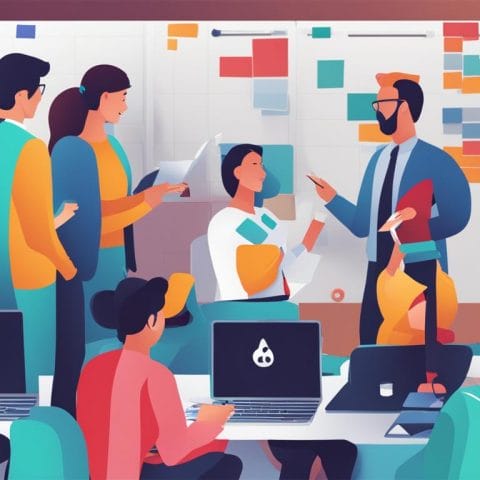Are you tired of following the same cookie-cutter career paths? Do you yearn for a personalized approach that truly caters to your unique goals and aspirations? Look no further, because personalized career development paths are here to revolutionize your professional journey.
Imagine having a career plan specifically designed for you, tailored to your skills, interests, and ambitions. With the help of AI technology, personalized career development paths can identify the exact skills you need to acquire or improve upon, and provide you with the resources and opportunities to do so. It’s like having a personal career coach guiding you every step of the way. But how does it all work? Let’s dive deep into the world of personalized career development paths and discover the endless possibilities they offer.
Key Takeaways:
- Personalized career development paths use AI to design tailored career plans based on individual goals and skills.
- By aligning career goals with personalized guidance and support, individuals can unlock their professional growth potential.
- Organizations like EY are committed to providing customized career development opportunities to their employees.
- Integrating career development into the hiring process and leveraging technology-enabled learning platforms can enhance personalization.
- Embracing both traditional and nontraditional methods of career progression can accommodate diverse career aspirations.
The Importance of Personalized Career Development
Personalized career development is crucial in today’s rapidly changing job market. It allows individuals to stay relevant and competitive by continuously learning and acquiring new skills. With personalized career development, individuals can create an individualized career plan that aligns with their career goals and aspirations. This approach also provides access to career coaching and guidance to help individuals navigate their career path and make informed decisions to advance their careers.
Emphasizing the importance of personalized career development, career coaching plays a vital role in providing individuals with the necessary support and guidance to navigate their professional journeys. Through one-on-one sessions, career coaches help individuals identify their strengths, interests, and goals, providing valuable insights to shape their career paths. They assist in exploring different career options, identifying skill gaps, and creating strategies to bridge those gaps for career advancement.
Having personalized career development is like having a strategic roadmap to success. It enables individuals to make informed decisions, strategically invest in skill development, and leverage their strengths to achieve their professional goals.
Moreover, individuals with personalized career development plans have a clear understanding of their long-term objectives and the steps required to reach them. They can identify opportunities for professional growth and tailor their learning experiences to enhance their knowledge and expertise in their chosen field. A personalized career development plan acts as a roadmap, guiding individuals towards career success and fulfillment.
The Role of Individualized Career Plans
Individualized career plans are instrumental in helping individuals take proactive control of their professional growth. These plans involve setting specific goals and outlining actionable steps to achieve those goals. They enable individuals to identify areas for improvement and focus their efforts on acquiring the necessary skills and knowledge.
| Benefits of Individualized Career Plans | How They Help |
|---|---|
| 1. Clarity | Provides a clear direction and purpose in one’s career journey. |
| 2. Focus | Enables individuals to prioritize their efforts and invest time in relevant skill development. |
| 3. Motivation | Keeps individuals motivated and engaged by tracking progress and celebrating milestones. |
| 4. Adaptability | Allows for adjustments and revisions as career goals and market trends evolve. |
With the guidance of a career coach, individuals can design an individualized career plan that aligns with their unique goals, strengths, and aspirations. This plan serves as a roadmap, guiding individuals towards career advancement and enabling them to make strategic decisions throughout their professional journey.
By investing in personalized career development, individuals can unlock their full potential, adapt to the ever-changing job market, and confidently pursue their career goals.
EY’s Approach to Personalized Career Development
EY, a leading global professional services organization, is committed to providing custom career development opportunities to its employees. They offer various programs to ensure tailored career guidance and support.
EY Badges is one of the initiatives implemented by EY to enhance personalized career development. This program allows employees to earn digital badges for future-focused skills. By participating in specific learning activities and demonstrating mastery, employees can showcase their expertise and continuously enhance their professional growth.
In collaboration with Hult International Business School, EY offers the EY Tech MBA program. This program equips employees with essential skills in technology and management, enabling them to navigate the challenges of the future effectively. Through this partnership, individuals receive the necessary knowledge and capabilities to excel in the rapidly evolving professional landscape.
Additionally, EY has introduced a program called LEAD. This program focuses on providing ongoing feedback and establishing personalized development paths for individuals. With LEAD, employees receive guidance tailored to their unique aspirations and developmental needs. This approach empowers individuals to maximize their potential and accelerate their career progression within the organization.
Custom Career Development Programs at EY
The table below highlights the various custom career development programs offered at EY:
| Program | Description |
|---|---|
| EY Badges | Earn digital badges for future-focused skills through specific learning activities and mastery |
| EY Tech MBA program | In collaboration with Hult International Business School, acquire essential technology and management skills |
| LEAD | Ongoing feedback and personalized development paths to help individuals reach their full potential |
These programs exemplify EY’s commitment to offering custom career development opportunities that provide employees with the necessary tools to navigate their professional journeys successfully.
Integrating Career Development into the Hiring Process
Career development plays a vital role in attracting and retaining top talent. Companies that prioritize tailored professional development are more likely to attract candidates who align with their long-term goals. The integration of career development throughout the hiring process ensures that individuals feel supported and invested in from the very beginning.
Highlighting Career Development in Job Listings
Effective job listings go beyond listing responsibilities and requirements; they also showcase the company’s commitment to tailored professional development. By explicitly stating the opportunities for skill mapping and career growth, companies can appeal to candidates who are seeking long-term advancement.
“At our company, we believe in empowering our employees to reach their full potential. Our personalized career development programs offer tailored professional development opportunities to help you grow in your chosen field.”
Discussing Skills and Career Goals During Interviews
The interview process presents an excellent opportunity to understand candidates’ skillsets and career goals. By discussing these aspects, employers can better shape a professional development plan to support the candidate’s growth. This approach ensures that the candidate’s career aspirations align with the company’s goals, resulting in a mutually beneficial partnership.
Onboarding and Career Goal Alignment
The onboarding process is a crucial time to lay the foundation for an employee’s professional journey. By centering the employee’s career goals and demonstrating a commitment to tailored professional development, organizations can foster a sense of value and investment from day one.
During onboarding, HR professionals can collaborate with new hires to establish career development plans and align them with the employee’s long-term aspirations.
Integrating Career Development at Each Hiring Stage
| Hiring Stage | Integration of Career Development |
|---|---|
| Job Listings | Highlight tailored professional development opportunities |
| Interviews | Discuss skills and career goals to shape a development plan |
| Onboarding | Align career goals and establish development plans |
Utilizing Technology for Personalized Career Development

Technology plays a crucial role in enabling individuals to achieve career growth and professional development. With the advent of technology-enabled learning platforms, such as LinkedIn Learning Hub, learners now have access to personalized resources and tools that align with their career paths and goals.
By leveraging advanced AI algorithms, these platforms offer specialized learning paths and role-based content that cater to the specific needs of individuals. Learners can navigate through curated content that directly relates to their career paths, ensuring a targeted and relevant learning experience.
Through skill evaluations, learners can assess their current skill sets and identify areas for improvement. This self-awareness allows individuals to focus their professional development efforts on the specific competencies that are most valuable in their desired fields.
Furthermore, technology-enabled learning provides unprecedented flexibility and accessibility. Learners can set their own pace and access learning materials at any time, from anywhere. This convenience enables individuals to fit their professional development activities into their busy schedules, promoting continuous learning and growth.
In summary, technology-enabled learning platforms revolutionize personalized career development by offering tailored resources, skill assessments, and flexible learning experiences. Leveraging technology in this way empowers individuals to actively pursue their career goals and access the resources they need to thrive in today’s rapidly evolving professional landscape.
Traditional vs. Nontraditional Methods of Career Progression
As the dynamics of the professional landscape continue to evolve, traditional career paths and ladders are no longer the sole avenues for career progression. Nontraditional methods have emerged, offering individuals alternative routes to advance their careers and explore diverse opportunities while still achieving their career goals. These nontraditional methods include dual career ladders, horizontal career lattices, and career progression outside the organization.
Nontraditional methods of career progression provide individuals with the flexibility to carve out unique paths that align with their aspirations and individuality. By embracing these alternative approaches, organizations can foster an inclusive and diverse work culture that accommodates the varied needs and career goals of their employees.
Let’s take a closer look at some of these nontraditional methods:
Dual Career Ladders
Dual career ladders offer professionals the opportunity to advance in their careers without necessarily transitioning into managerial roles. This allows individuals to specialize and grow in their respective areas of expertise rather than being limited to traditional hierarchical structures. For example, in the tech industry, an individual can choose to stay in a technical role and still progress by becoming a distinguished engineer or a technical fellow.
Horizontal Career Lattices
Horizontal career lattices provide lateral movement across different roles and departments within an organization. Instead of following a linear path, individuals can explore various functions and gain a broader perspective of the organization as a whole. This flexibility encourages continuous learning and collaboration, enabling individuals to acquire diverse skill sets and make well-informed career decisions.
Career Progression Outside the Organization
Nontraditional career progression also involves opportunities outside the current organization. This could include freelancing, entrepreneurship, consulting, or pursuing passion projects that may lead to new ventures. By venturing beyond the boundaries of a single organization, individuals can tap into different industries, expand their networks, and gain diverse experiences that contribute to personal and professional growth.
To better illustrate the comparison between traditional and nontraditional methods of career progression, we have created a table highlighting key differences:
| Traditional Career Paths | Nontraditional Methods |
|---|---|
| Vertical advancement within a single department | Lateral movement across various roles and departments |
| Focus on hierarchical promotions | Emphasis on specialized growth and unique career trajectories |
| Limited scope within the organization | Expanding horizons by exploring opportunities outside the organization |
| Structured and predefined career paths | Flexible and tailored approaches to career development |
By embracing both traditional and nontraditional methods, organizations can empower their employees to take charge of their career journeys and find fulfillment in their professional lives. Recognizing the value of diverse career paths, organizations can foster a culture of innovation, adaptability, and personal growth.
The Impact of Career Paths on Organizational Success

Implementing career paths can have a significant impact on organizational success. By providing clear pathways for career progression, organizations can enhance employee engagement and satisfaction, ultimately leading to improved productivity and performance.
When employees have well-defined career paths, they are more likely to feel motivated and committed to their work. They understand how their individual contributions align with the larger organizational objectives, leading to a greater sense of purpose and fulfillment.
Employee engagement plays a crucial role in achieving organizational objectives. Engaged employees are more likely to go above and beyond their job responsibilities, contributing innovative ideas and driving positive change within the organization.
“Employee engagement is the emotional commitment an employee has to the organization and its goals, resulting in discretionary effort.”
By aligning individual career goals with the objectives of the organization, companies can strengthen employee loyalty and retention. When employees see a clear path for growth and development within the organization, they are more likely to stay committed and invested in their careers.
Measuring the impact of career development programs is crucial to ensuring their effectiveness. Organizations can use metrics such as employee turnover rates, employee satisfaction surveys, and productivity measures to evaluate the success of their career paths and make necessary adjustments to achieve desired outcomes.
Investing in personalized career development not only benefits individual employees but also contributes to a thriving organizational culture. Organizations that prioritize career development foster an environment of continuous learning, growth, and improvement.
Ultimately, organizations that recognize and support the importance of career paths in driving employee engagement and aligning individual goals with organizational objectives are better positioned to achieve long-term success.
Key Takeaways:
- Career paths improve employee engagement and satisfaction.
- Engaged employees are more likely to contribute to organizational objectives.
- Aligning individual career goals with organizational objectives fosters loyalty and retention.
- Measuring the impact of career development programs is crucial for success.
- Investing in personalized career development promotes a culture of continuous learning and improvement.
HR’s Role in Supporting Personalized Career Development
HR professionals play a crucial role in supporting personalized career development. They are instrumental in creating an environment where employees can thrive and achieve their full potential. By understanding the unique needs and aspirations of individuals, HR can provide the necessary resources and tools for career enhancement and job enlargement.
One of HR’s key responsibilities is to encourage employees to take ownership of their career paths. This can be done through ongoing conversations and mentorship programs that empower individuals to set clear goals and identify areas for growth. By fostering a culture of continuous learning and development, HR ensures that employees have the necessary support to pursue their career aspirations.
When it comes to skill enhancement, HR should provide access to training programs and learning opportunities that align with employees’ career goals. This could include workshops, webinars, or online courses tailored to specific job roles or professional skills. By investing in employees’ professional growth, HR demonstrates a commitment to their success and overall career satisfaction.
Furthermore, HR should work closely with managers to develop career paths for their team members. By mapping out the possibilities for growth within the organization, HR helps employees see a clear progression plan and understand the steps they need to take to advance their careers. This collaborative approach ensures that career paths are not only aligned with organizational objectives but also take into account individual skills, interests, and aspirations.
In addition, HR should view employees as valuable organizational resources rather than exclusive assets. By recognizing and developing the potential of employees, HR creates a culture where career development is prioritized. This can be done through coaching and mentoring programs that provide guidance and support to employees as they navigate their career paths.
By adopting these practices, HR professionals can play a pivotal role in supporting personalized career development within an organization. They help create an environment where individuals are encouraged to explore new opportunities, expand their skill sets, and achieve their career goals. Ultimately, HR’s commitment to personalized career development contributes to the overall growth and success of both employees and the organization.
Conclusion
Personalized career development paths provide individuals with a solution to effectively navigate their career journeys and achieve their professional goals. Leveraging AI technology, organizations like EY can design tailored career development paths that align with learners’ unique skills and aspirations.
Integration of career development into the hiring process and the use of technology-enabled learning platforms further enhance personalized career development. By embracing both traditional and nontraditional methods of career progression, organizations can accommodate the diverse needs of their employees and foster a culture of growth and development.
With the support and guidance of HR professionals, individuals can take charge of their career growth and unlock their full potential. The implementation of personalized career development paths not only benefits individuals but also contributes to the success of organizations by improving employee engagement, satisfaction, and productivity.
Overall, personalized career development paths are a key driver in helping individuals shape their futures, acquire new skills, and reach their desired professional destinations.
FAQ
What is personalized career development?
Personalized career development is an approach that uses AI technology to design career paths tailored to the learner’s goals and skills. It helps individuals unlock their potential and take charge of their professional growth by providing customized guidance and support based on their unique needs and aspirations.
Why is personalized career development important?
Personalized career development is important because it allows individuals to stay relevant and competitive in today’s rapidly changing job market. It enables individuals to create an individualized career plan that aligns with their career goals and aspirations, while also providing access to career coaching and guidance to help navigate their career path.
How does EY support personalized career development?
EY, a leading global professional services organization, supports personalized career development through various programs such as EY Badges, EY Tech MBA program, and LEAD. These programs offer employees opportunities to develop future-focused skills, provide ongoing feedback, and personalized development paths to help individuals reach their full potential.
How can career development be integrated into the hiring process?
Career development can be integrated into the hiring process by highlighting the company’s commitment to tailored professional development in job listings. During the interview process, candidates’ skills and career goals can be discussed to shape a professional development plan. Onboarding is also an opportune time to center an employee’s professional goals and make them feel valued and invested in.
How can technology be utilized for personalized career development?
Technology plays a crucial role in personalized career development. Platforms like LinkedIn Learning Hub offer specialized learning paths and role-based content, allowing learners to navigate through curated content around their career paths. These platforms also provide skill evaluations to help learners assess their skills and identify areas for improvement.
What are traditional and nontraditional methods of career progression?
Traditional methods of career progression include career paths and career ladders within an organization. Nontraditional methods include dual career ladders, horizontal career lattices, and career progression outside the organization. These nontraditional methods provide alternative ways for individuals to advance their careers and explore different opportunities.
What impact do career paths have on organizational success?
Implementing career paths can have a significant impact on organizational success. Career paths improve employee engagement and satisfaction, which can positively influence productivity and performance. By aligning individual career goals with organizational objectives, companies can increase employee loyalty and retention.
What is HR’s role in supporting personalized career development?
HR professionals play a crucial role in supporting personalized career development. They should encourage employees to take control of their own career paths, provide resources and tools for skill enhancement, and assist managers in developing career paths for their team members. HR should also foster a culture of career development and offer coaching and mentoring opportunities.
How can individuals benefit from personalized career development paths?
Personalized career development paths offer individuals a solution to navigate their career journeys and achieve their professional goals. By leveraging AI technology, organizations can design tailored paths that align with learners’ skills and aspirations. With the support of HR professionals, individuals can take charge of their career growth and unlock their full potential.





